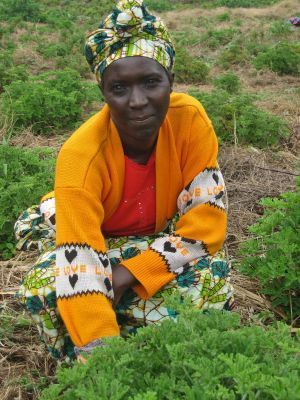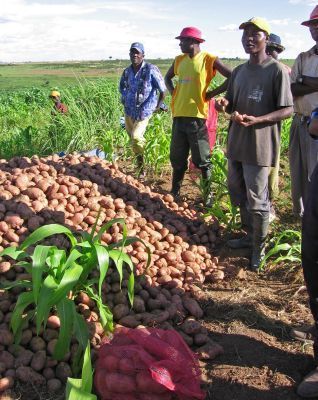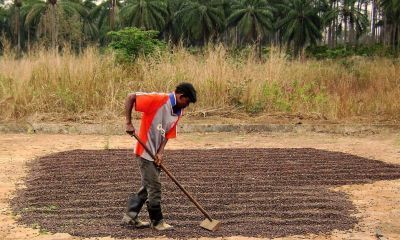Ivy Newton-Gamble's Blog: Everyday African Food, page 3
May 1, 2012
Marake Kaloune (Fish in Sauce)
 Marake Kaloune (Fish in Sauce)
Marake Kaloune (Fish in Sauce)
Yield 4-6 servings
Ingredients:
3 large russet potatoes, peeled and sliced into rounds
2 yellow onions cut into rings
4 okra, chopped
1 eggplant, peeled and diced
2 tomatoes, blanched, peeled and diced
1 bunch parsley, chopped
2 tbsp tamarind paste
garlic, salt and pepper to taste
oil for frying
2 large firm flesh fish, cleaned, de-scaled and chopped into steaks
Directions:
Fry the potatoes in oil until just brown then add the onions to the mix and fry until golden. Add the okra and eggplant then mix-in the tamarind paste and season with the garlic, salt and pepper. Add the fish and enough water to cover. Bring to a boil, reduce to a simmer, and add the parsley and cook for about 15 minutes or until the rice is done. Serve immediately.
April 30, 2012
Geranium essential oil and Rwanda
 Take a deep breath and think of Rwanda. Most likely memories of the genocide overwhelm your senses. Nearly sixteen years on from the genocide, while these feelings do still linger, Rwanda is moving on and a sense of well-being is wafting out of Rwanda.
Take a deep breath and think of Rwanda. Most likely memories of the genocide overwhelm your senses. Nearly sixteen years on from the genocide, while these feelings do still linger, Rwanda is moving on and a sense of well-being is wafting out of Rwanda.
Rwanda is a country that has no gold, no diamonds, indeed virtually no natural resources. It is amongst the world’s least developed countries, ranking 159 of 177 in the United Nations Development Program’s Human Development Index.
Like the majority of Rwandans, farming is in the blood of these people. However, the level of attention they had to show towards weeding, and nurturing the geranium plants was new. Unlike the banana and bean plants that are the staple crops of Rwanda, the geranium plant needs a lot of nurturing. For a start, the crop has to be organic to gain the best price. This means that the farmers have to make sure that they use no chemical pesticides or fertilizers and keep a log of all the insect problems and the pest control methods they take. Weeding, mulching and providing manure to the soil are all important techniques which they have learnt.
In Byumba province, a small group of farmers are ‘prospecting’ in the essential oil business. Crossing a small stream over a roughly made bridge, a group of women companionably wash their hands and feet in the water. By the time you arrive in the field, it smells like you are entering an aromatherapy shop. The geranium oil that has been distilled in the past year has all been declared perfect. Geranium essential oil is recommended by aromatherapists to perfume the room for a feeling of well-being. Perhaps in the future, people will think of Rwanda in terms of the well-being they associate with geranium essential oil. For the farmers in these two associations, if people buy their geranium essential oil for their well-being, they will certainly see an improved quality of life.
April 28, 2012
Nigerian Stew
Nigerian Stew is the basis for most Nigerian soups/stews. It is made from a blended mix of peppers, tomatoes and onions. This tasty and aromatic stew is everyone’s favorite in Nigeria.
Nigerian Stew
Yields 3-4 servings
Ingredients:
2 lbs. white meat chicken cut into small stripes
1 15 oz. can tomato sauce
1 chopped yellow onion
1 tablespoon red pepper flakes
Black pepper & salt to taste
3 tablespoons olive oil
2 cups white rice
Directions:
Heat oil brown onions. Add all ingredients into a large pot cover and simmer 30 minutes

April 27, 2012
République du Burundi
The Republic of Burundi- English
Republika y’u Burundi- Kirundi
République du Burundi- French

Nationality
noun: Burundian(s)
adjective: Burundian
Burundi is landlocked and one of the smallest countries in Africa. The economy of Burundi is predominantly agricultural. Burundi is one of the world’s poorest countries. Its capital is Bujumbura. Although the country is landlocked, much of the southwestern border is adjacent to Lake Tanganyika. The Tutsi minority, 14% of the population, dominates the coffee trade.
Ethnic groups:
Hutu (Bantu) 85%, Tutsi (Hamitic) 14%, Twa (Pygmy) 1%, Europeans 3,000, South Asians 2,000
An ethnic-based war that lasted for over a decade resulted in more than 200,000 deaths, forced more than 48,000 refugees into Tanzania, and displaced 140,000 others internally. Burundi and Rwanda dispute two sq km (0.8 sq mi) of Sabanerwa, a farmed area in the Rukurazi Valley where the Akanyaru/Kanyaru River shifted its course southward after heavy rains in 1965; cross-border conflicts persist among Tutsi, Hutu, other ethnic groups, associated political rebels, armed gangs, and various government forces in the Great Lakes region.
Languages:
Kirundi (official), French (official), Swahili (along Lake Tanganyika and in the Bujumbura area)
Burundi’s literacy rate is low due to school attendance. Burundi’s oral tradition is strong, relaying history and life lessons through storytelling, poetry, and song. Imigani, indirimbo, amazina, and ivyivugo are types of literary genres existing in Burundi.
Religions:
Christian 67% (Roman Catholic 62%, Protestant 5%), indigenous beliefs 23%, Muslim 10%
April 26, 2012
Mozambique in Pictures
[image error] [image error] [image error] [image error]
[image error] [image error]
April 24, 2012
Orange Bread
2 1/2 cups sifted all-purpose flour
1 tablespoon baking powder
1 teaspoon salt
1 cup sugar
1/4 cup shortening
3/4 cup milk
1/4 cup fresh orange juice
1 egg, beaten
3 tablespoons fresh grated orange rind
1 cup chopped pecans or walnuts
Directions:
Sift dry ingredients into a mixing bowl; cut in shortening with a pastry blender. Add milk, orange juice, and egg. Mix just enough to moisten dry ingredients. Add grated orange rind and chopped nuts. Pour into a greased loaf pan, spreading batter to corners. Bake at 350° for 55 to 60 minutes. Turn onto rack to cool. Best if made at least one day in advance.
April 21, 2012
Isango Ensemble, a South African theatre company
Isango Ensemble is an internationally renowned South African theatre company who performs plays in Zulu, Xhosa, Sotho, Tswana, Afrikaans and South African English to name a few languages. The company is based in Cape Town and draws its artists from the townships around South Africa.
There will be performances of all William Shakespeare’s plays in 38 different languages as part of the festivities surrounding the London 2012 Olympic Games. Isango Ensemble, famous for transposing classical operas and Shakespearean plays into South African settings.
April 20, 2012
Tunisia, an Arab Maghreb Country
 People and History
People and History
Nationality: Noun and adjective–Tunisian(s).
Population (2010): 10.549 million.
Ethnic groups: Arab-Berber 98%, European 1%, other 1%.Religions: Muslim 99%, Christian less than 1%, Jewish less than 1%.
Languages: Arabic (official), French.
Modern Tunisians are descendants of indigenous Berbers and of people from numerous civilizations that have invaded, migrated to, and been assimilated into the population over the millennia. Recorded history in Tunisia begins with the arrival of Phoenicians, who founded Carthage and other North African settlements in the 8th century B.C. Carthage became a major sea power, clashing with Rome for control of the Mediterranean until it was defeated and captured by the Romans in 146 B.C. The Romans ruled and settled in North Africa until the 5th century, when the Roman Empire fell and Tunisia was invaded by European tribes, including the Vandals. The Muslim conquest in the 7th century transformed Tunisia and the make-up of its population, with subsequent waves of migration from around the Arab and Ottoman world, including significant numbers of Spanish Muslims and Jews at the end of the 15th century. Tunisia became a center of Arab culture and learning and was assimilated into the Turkish Ottoman Empire in the 16th century. It was a French protectorate from 1881 until independence in 1956, and retains close political, economic, and cultural ties with France.
Nearly all Tunisians (99% of the population) are Muslim. There has been a Jewish population on the southern island of Djerba for 2,000 years, and there remains a small Jewish population in Tunis and other cities, which is mainly descended from those who fled Spain in the late 15th century. A small Christian community is dispersed throughout the country, and includes foreign residents, as well as a few hundred native-born citizens who have converted to Christianity. Small nomadic indigenous minorities have been mostly assimilated into the larger population.
Post-Independence History
Tunisia’s independence from France in 1956 ended a protectorate established in 1881. President Habib Bourguiba, who had been the leader of the independence movement, declared Tunisia a republic in 1957, ending the nominal rule of the Ottoman Beys. In June 1959, Tunisia adopted a constitution modeled on the French system, which established the basic outline of the highly centralized presidential system. The military was given a defined defensive role, which excluded participation in politics. Starting from independence, President Bourguiba placed a strong emphasis on economic and social development–especially education, the status of women, and the creation of jobs–policies that continued under the Zine El Abidine Ben Ali administration. The result was strong social progress–high literacy and school attendance rates, low population growth rates, and relatively low poverty rates–and generally steady economic growth. Over the years, President Bourguiba stood unopposed for re-election several times and was named “President for Life” in 1974 by a constitutional amendment.
In 1987, Ben Ali deposed Bourguiba, promising greater democratic openness and respect for human rights. Although the ruling Socialist Destourian Party (PSD) was renamed the Democratic Constitutional Rally (RCD), it continued to dominate the political scene. The RCD won all seats in the Chamber of Deputies in 1989, and won all of the directly elected seats in the 1994, 1999, and 2004 elections. President Ben Ali ran for re-election unopposed in 1989 and 1994. In the multiparty era, he won 99.44% of the vote in 1999 and 94.49% of the vote in 2004. A May 2002 referendum approved constitutional changes proposed by Ben Ali that allowed him to run for a fifth term in 2009, which he won with 89% of the vote (and 89% participation). The referendum also created a second parliamentary chamber, the Chamber of Advisors, and provided for other changes. Lack of political freedom characterized the Tunisian landscape under the Ben Ali regime. The State Department’s annual human rights report consistently cited infringements on freedoms of assembly and expression, as well as reports of torture and abuse of prisoners. The oppressive political environment, coupled with extreme economic inequality, opaque political and economic national decision-making and the government’s insensitivity to popular demands for greater economic opportunity, gave rise to a popular revolution that began on December 17, 2010 when Mohamed Bouazizi, a young Tunisian vegetable vendor from the interior of the country, self-immolated to protest the government’s confiscation of his produce. His subsequent death resulted in protests in his hometown of Sidi Bouzid, which quickly spread to other cities, including the capital. On January 14, 2011, following nearly 2 months of popular demonstrations and protests calling for his removal from office, President Ben Ali abdicated power and voluntarily entered into exile in Saudi Arabia, leaving the country in the hands of a caretaker government. Shortly after Ben Ali’s departure, Speaker of the Parliament Fouad Mbazza ascended to the position of interim President of Tunisia on the basis of Article 57 of the Tunisian constitution. Upon the resignation of Prime Minister Mohamed Ghannouchi on February 27, Mbazza appointed former diplomat and cabinet official Beji Caid Essebsi to the position on February 28, 2011.
Mandinka Griots
 Mandinka culture is rich in tradition and music. Mandinkas long have a rich oral history custom through the use of stories and songs. The Mandinka have a rich oral history that is passed down through griots. The griot is an invaluable rich cascade of oral traditions and as a historian, advisor, arbitrator, and storyteller. Essentially, these griots are walking history books, preserving ancient stories and traditions through song. Their inherited custom was passed down through generations. This passing down of oral history through music has made music one of the most distinctive traits of the Mandinka.
Mandinka culture is rich in tradition and music. Mandinkas long have a rich oral history custom through the use of stories and songs. The Mandinka have a rich oral history that is passed down through griots. The griot is an invaluable rich cascade of oral traditions and as a historian, advisor, arbitrator, and storyteller. Essentially, these griots are walking history books, preserving ancient stories and traditions through song. Their inherited custom was passed down through generations. This passing down of oral history through music has made music one of the most distinctive traits of the Mandinka.
Griots are treasured for the power and persuasion their melody can convey. Even though the role of the griot has lessened with the introduction of modern culture, the griot still remains an essential part of the culture of Mandinka culture and an essential link to centuries of oral history. For hundreds of years griots keep accounts of family and village history alive. This tradition gives the Mandinka people their strong sense of ethnic identity and history. They have long been known for drumming and the distinctive musical instrument, the kora. The kora is a twenty-one-stringed guitar-like instrument made out of a halved, dried, hollowed-out gourd covered with cow or goat skin.
April 19, 2012
Angola in Pictures
[image error]

 [image error]
[image error]
The Republic of Angola is a country in southern Africa bordered by Namibia on the south, the Democratic Republic of the Congo on the north, and Zambia on the east; its west coast is on the Atlantic Ocean with Luanda as its capital city.
[image error]
[image error] [image error]
Everyday African Food
- Ivy Newton-Gamble's profile
- 17 followers



